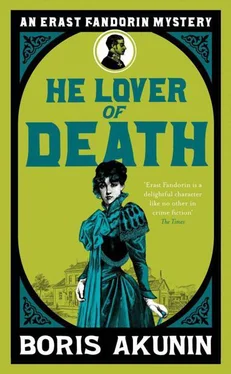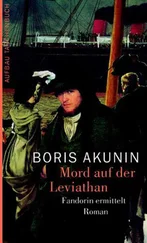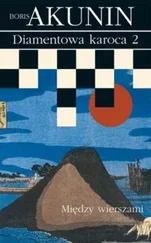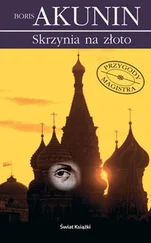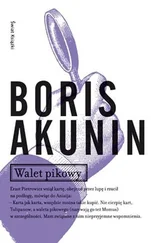But Tashka, that Tashka! What a girl she was – pure gold!
Senka might have scarpered, but he still had to get rid of this iron lump. He walked along, pressing his hands to his chest, with the ends of the bar turned up and down, so they wouldn’t be so obvious.
He had to clear out of Khitrovka – not just because it was dangerous with that Erast Petrovich about, but so no one he knew would see him looking silly like this. They’d laugh him down for sure.
He could go into the smithy, where they forged horseshoes, and tell them some lie or other about how the iron bar had been twisted on him out of mischief, or as a bet. They were big hefty lads in the smithy. Maybe they didn’t have a grip to match the handsome gent’s, but they’d unbend it one way or another, they had tools for doing just that. But not for a kind word and a nod, of course – he’d have to give them twenty kopecks.
And then it hit him: where was he going to get twenty kopecks from? He’d given his last fifteen-kopeck piece to the mole yesterday. Or maybe he should diddle the blacksmith? Promise him money then do a runner. Even more running, Senka thought with a sigh. If the blacksmiths caught him, they’d batter him with those big fists of theirs, worse than any Japanese.
So there he was, walking down Maroseika Street, wondering what to do, when he saw a shop sign: ‘SAMSHITOV. Jeweller and goldsmith. Fine metalworking’. That was just what he needed! Maybe the jeweller would give him something at least for the silver coin, or even those old kopecks. And if he didn’t, Senka could pawn Sprat’s watch.
He pushed open the door with the glass window and went in.
There was no one behind the counter, but there was a red parrot bird, sitting on a perch in its cage, and screeching in a horrible voice: ‘Wel-come! Wel-come!’
Just to be safe, Senka doffed his cap and said: ‘Good health to you.’
It may have been a beast, but it clearly had some understanding.
‘Ashot-djan, the door’s not locked again,’ a woman called from the back of the shop in an odd, lilting voice. ‘Anyone at all could come in off the street!’
There was a rustle of steps and a short man popped his head out from behind the curtain. He had a deep-set face and a crooked nose and a round piece of glass set in a bronze frame on his forehead. He sounded frightened as he asked: ‘Are you alone?’
When he saw that Senka was, he ran to bolt the door, then turned again to his visitor. ‘What can I do for you?’
Someone like him could never unknot an iron bar, thought Senka disappointedly. So what was that about metalworking on the sign? Maybe he had an apprentice.
‘I’d like to sell something,’ Senka said, and reached into his pocket, but that was no mean feat with his hands shackled together.
The parrot began to mock him: ‘Sell something! Sell something!’
The man with the big nose said: ‘Shut up, shut up, Levonchik.’ Then he looked Senka up and down and said, ‘I’m sorry, young man, but I don’t buy stolen goods. There are specialists for that.’
‘You don’t need to tell me you that. Here, what will you give me?’
And he plonked the coin down on the counter.
The jeweller stared at Senka’s wrists, but he didn’t say a word. Then he looked at the silver coin without any real interest.
‘Hmm, a yefimok.’
‘Come again?’ said Senka.
‘A yefimok, a silver thaler. Quite a common coin. They go for double weight. That is, the weight of the silver, multiplied by two. Your yefimok’s in good condition.’ He took the coin and put it on the balance. ‘In ideal condition, you could say. A perfect thaler, six and a half zolotniks in weight. One zolotnik of silver is . . . twenty-four kopecks now. That makes . . . hmm . . . three roubles twelve kopecks. Minus my commission, twenty per cent. In total, two roubles and fifty kopecks. No one’s likely to give you more than that.’
Two roubles fifty – well, that was something. Senka writhed around again, reached into his pocket for the scales, and tipped them on to the counter.
‘And what about this?’
He had exactly twenty of those scales, he’d counted them during the night. They were pretty battered kopecks, but if you added them to two roubles fifty, that would make two seventy.
The jeweller was more impressed by the kopecks than he was by the yefimok. He moved the lens off his forehead onto his eye and examined them one by one.
‘Silver kopecks? Oho, “YM” – Yauza Mint. And in enviable condition. Well, I can take these for three roubles apiece.’
‘How much?’ Senka gasped.
‘You have to understand, young man,’ said the jeweller, looking at Senka through the lens with a huge black eye. ‘Pre-rebellion kopecks, of course, are not thalers, and they go for a different rate. But they dug up another hoard from that time only recently, over in Zamoskvorechie, three thousand silver kopecks, including two hundred from the Yauza Mint, so their price has fallen greatly. How would you like three fifty? I can’t go higher than that.’
‘How much will that make altogether?’ Senka asked, still unable to believe his luck.
‘Altogether?’ Samshitov clicked the beads on his abacus and pointed: ‘There. Including the yefimok, seventy-two roubles and fifty kopecks.’
Senka could barely croak out his answer: ‘Fine, all right.’
And the parrot went off again: ‘All right! All right! All right!’
The jeweller raked the coins off the counter and jangled the lock of his cash box. There was the sound of banknotes rustling – pure music to Senka’s ears. Now was this really something, big money!
The woman’s voice sang out again from the back of the shop. ‘Ashotik-djan, are you going to take your tea?’
‘Just a moment, dear heart,’ said the jeweller, turning towards the voice. ‘I’ll just let this client out.’
The lady of the house appeared from behind the curtain, carrying a tray, with a glass of tea in a silver holder and a little dish of sweets –very neat it looked too. The woman was stout, a lot bigger than her little titch of a husband. She had a moustache under her nose and hands like sugar loaves.
Mystery solved! With a woman like that, you didn’t need an apprentice.
‘There’s this as well . . .’ Senka said, clearing his throat as he showed them his hands and the metal bar. ‘I’d like to get untangled . . . The lads played a joke . . .’
The woman took one look at his shackled hands then went back behind the curtain without saying a word.
But the jeweller took the bar in his skinny hands, and Senka was amazed when he straightened it out in a trice. Not all the way, but at least enough for him to pull his wrists out. Good old Ashotik!
While Senka was stuffing the banknotes and ten-kopeck pieces in his pockets, his hands nice and free, Samshitov was eyeing up the rod. He dropped something on it from a little bottle and scraped the surface. Then he pulled down his lens, put one end of the rod to his eye, and began to mop his bald patch with a handkerchief.
‘Where did you get this?’ he asked, and his voice was trembling.
As if Senka was going to tell him that! But he didn’t come out with, ‘Where from, where from? A stroke of luck. If you want to know more, you can get ****ed,’ because Ashot was a good man, he’d helped him out.
So Senka said politely: ‘From the right place.’ And then he turned to go. He had to think what to do with his sudden riches.
But then didn’t the jeweller go and blurt out: ‘How much do you want for it?’
Pull the other one – for scrap iron?
But Samshitov’s voice was really shaking now.
‘It’s incredible,’ he said, rubbing the rod with a wet rag. ‘I’ve read about the thaler rod, of course, but I didn’t think any others had survived . . . And the hallmark of the Yauza Mint!’
Читать дальше
